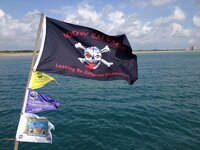Salvor6
Silver Member
- Feb 5, 2005
- 3,758
- 2,177
- Detector(s) used
- Aquapulse, J.W. Fisher Proton 3, Pulse Star II, Detector Pro Headhunter, AK-47
- Primary Interest:
- Shipwrecks
A couple other things that are left out. The archies want to preserve the wrecks "in situ" and create underwater museums. Well, how can you visit a museum 750 feet deep? Its rediculous. The archies will say "with underwater cameras." OK, what about the unknown artifacts that could change history that are buried 4 feet deep? We can never see or study them unless they are excavated. The archies have no answer for this.






